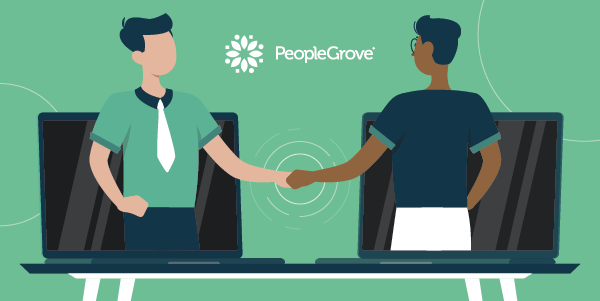Networking & Mentorship
Announcing Managed Formal Mentoring Programs: Personalized service to ensure your success
Mentoring Programs: Expanding beyond the tech The college experience is about more than just getting a degree. Students are looking […]
Networking & Mentorship
Mentoring Programs: Expanding beyond the tech The college experience is about more than just getting a degree. Students are looking […]


The college experience is about more than just getting a degree. Students are looking beyond the classroom for areas of personal and professional development. This is where PeopleGrove comes in – our software empowers students to unlock social capital and learn from others who have been in their shoes.
PeopleGrove believes that each and every student and professional should have access to the community and the connections needed to succeed before, during and after college. When connected, students are more likely to thrive, look back fondly on their university experience, and graduate and go on and have a successful career. As someone who has spent over a decade devoted to student success, this is a mission that resonates deeply with me and much of my day-to-day work over the past several years at PeopleGrove helps to deliver on this mission.
Mentoring involves a reciprocal relationship in which one person shares their knowledge, skills and expertise with another to help them progress personally and professionally. In working with our university partners, we tend to notice that broadly, two types of mentorship exist: informal and formal.
Informal mentorships can happen fluidly. A pair might meet one time to review a student’s resume, or discuss what a job is really like. These relationships could blossom into deeper longer lasting connections, or it could simply be a one time occurrence. Informational interviews, resume reviews, or simple Q&A sessions are all examples of informal mentorship.
Alternatively, formal mentorships require planning and purpose. Participants are paired together with intention. They meet regularly and work together through a shared framework and goals. Long-term mentoring programs, such as those organized with PeopleGrove’s Programs feature, help promote strong student self-efficacy, which makes a fundamental difference when applied to specific educational goals, career objectives, or personal emotional development.
In the past, we provided the technology to allow program admins to build, launch and maintain a Mentorship Program themselves. Our customers served as the administrators and program experts, and simply needed a tool to help reduce administrative overhead and allow for a virtual space for relationships to live and grow. We trained program administrators on how to use our software and matching algorithm effectively, but then let them execute since they were the experts and knew what to do.
Our company continues to evolve to meet the needs of our partners. Today, PeopleGrove’s team of program experts help customers build, launch and maintain mentorship programs. To date, we’ve launched over 300+ formal mentoring programs, and have 90,000+ users participating in long-term mentorship. We know what works and how to help our partners see lasting success.
What we have learned is that Organizations need to offer mentorship programs to effectively support their community, but they often lack the internal resources and expertise to design, launch, and maintain these programs. We assumed that higher education institutions had program experts in-house, but turns out many departments do not have the staff or expertise to build these programs.
PeopleGrove has always supported both types of mentorship through our flash network and formal mentoring programs, as different types of relationships and connections can help students grow and develop.

A managed, professional service approach allows universities and organizations to augment their team with PeopleGrove Program Management Experts instead of hiring someone. Having our team take the reins on all stages of the mentorship journey allows for mentorship programs to exist at a fraction of the cost of hiring a full-time employee. Not only is this less expensive, but our programs are also better designed. Through countless iterations and years of practice, we know what types of questions, training materials and goal setting is needed to help mentorships thrive.
For institutions that are interested, PeopleGrove runs a discovery session to understand the desired audience, timeframe and outcomes of the desired program. The client will have peace of mind as PeopleGrove will take on the responsibility of designing the program from the ground up, getting applicants invited and trained, and making sure mentors and mentees are well suited for one another when they’re matched. Once matching occurs, PeopleGrove takes full responsibility for ongoing management of the mentorships. It’s our job to ensure end users feel supported and highly engaged. Clients are able to see real-time data and reporting for how the mentorships are unfolding. PeopleGrove will help mentorships grow and thrive, and intervene when things just aren’t going as planned.
Today is a culmination of a months-long effort (by yours truly!) and I’m so excited to be able to officially roll this out as an option for current and new customers. If you’d like to learn more, visit peoplegrove.com/managed-formal-mentoring-programs.